| Srl | Item |
| 1 |
ID:
180746
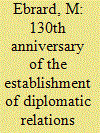

|
|
|
|
|
| Summary/Abstract |
RUSSIA is a country that generates great interest in Mexico. There is a deep appreciation for its culture and history, as well as recognition of its vast contributions to science, and its weight in the international system.
|
|
|
|
|
|
|
|
|
|
|
|
|
|
|
|
| 2 |
ID:
104675
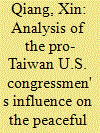

|
|
|
| 3 |
ID:
164106


|
|
|
| 4 |
ID:
094703
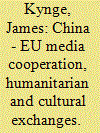

|
|
|
| 5 |
ID:
093746
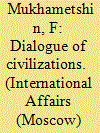

|
|
|
|
|
| Publication |
2009.
|
| Summary/Abstract |
MANY PROMINENT political and academic figures have announced the end of financial globalization as it was before the crisis. The philosophy of globalism itself based on the rapacious use of the planet's resources and complete disregard for the interests and the future of those not included among the "gold billion" has taken a severe blow. The saying goes that nature abhors a vacuum, thus a new paradigm of development of civilization is supposed to come along and replace the failed theory of mono-centric global management of the world.
|
|
|
|
|
|
|
|
|
|
|
|
|
|
|
|
| 6 |
ID:
133732
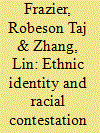

|
|
|
|
|
| Publication |
2014.
|
| Summary/Abstract |
This article examines Chinese cyberspace debates over the racial and national identity of a television show contestant Lou Jing, a biracial woman of Chinese and African American descent. We argue that the online commentary about her offers a productive entry point into contemporary Chinese cultural struggles over race. In particular, we consider how the Internet and other digital communication technologies are being mobilized as discursive sites for articulations of Chinese anti-black racism, as well as discursive sites of contestation, knowledge production, and cultural exchange regarding Chinese constructions of race and nationality.
|
|
|
|
|
|
|
|
|
|
|
|
|
|
|
|
| 7 |
ID:
117452
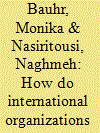

|
|
|
|
|
| Publication |
2012.
|
| Summary/Abstract |
How do international organizations (IOs) promote quality of government (QoG) and reduce corruption? IOs play a central role in most accounts of power in international relations. However, our understanding of how IOs exercise power seldom moves beyond the traditional material-normative dimensions of power. We suggest that an important dimension to understand IO power is the contestation-integration dimension, where IOs can exercise power either by integrating countries into networks of cultural exchange or by contesting existing orders. By analyzing multilateral aid data and building on recent advances in our understanding of the effectiveness of IO anti-corruption work, we apply this framework to show how the contestation-integration dimension helps us understand the success or failure of anti-corruption strategies. We show that when IOs contest existing orders using governance rankings and aid conditionality, they suffer from ideational shortcomings, including lack of objective data and contested policy advice. In contrast, measures based on integration, such as the membership process of IOs or interaction with IOs, are more likely to suffer from internal procedural shortcomings, such as IOs failing to internalize and mainstream the norms that they seek to promote. Our findings have implications for both understanding conditions that limit the diffusion of the international anti-corruption agenda and advancing our knowledge of IO power and its limits.
|
|
|
|
|
|
|
|
|
|
|
|
|
|
|
|